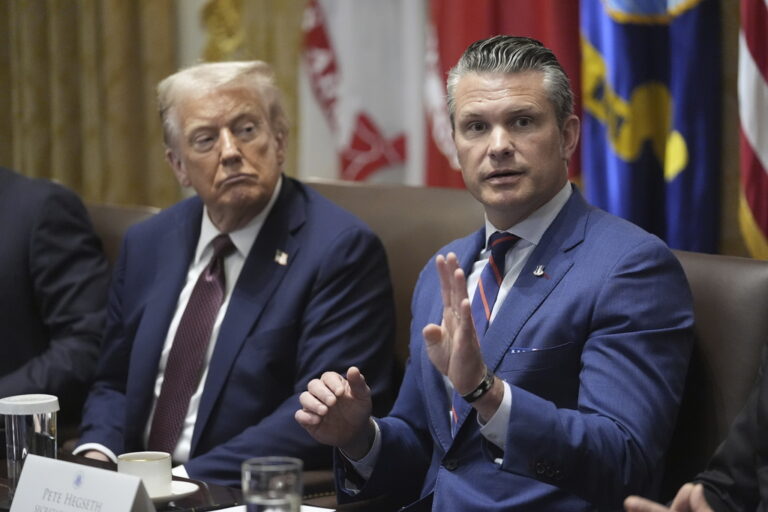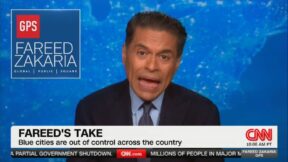The Pentagon’s Censorship Ultimatum and the War on Truth

(AP Photo/Mark Schiefelbein)
In the Trump Administration’s latest attack on journalism – and through journalism, the American people – the Pentagon is now demanding that reporters must sign a sweeping new agreement binding them to publish only information “explicitly authorized” by the Defense Department — or surrender their press credentials and vacate Pentagon facilities.
This astoundingly un-American edict confronts reporters with a choice familiar to colleagues from places like Russia: Comply and become propagandists, or refuse and serve the public by preserving your integrity.
To request that journalists agree to let the government determine which “unclassified” facts may be published is to transform them from watchdogs into state functionaries. Among those vowing resistance are The Washington Post, The New York Times, The Associated Press, CNN, NPR, The Atlantic, Reuters, The Guardian, Newsmax, The Washington Times, Breaking Defense, and Task & Purpose. Only One America News (OAN) has said it will sign.
The policy’s language is vague and overbroad: journalists could be branded “security risks” merely for reporting standard, non-sensitive facts that the Pentagon had not preapproved. This clearly imperils the First Amendment and undermines the public’s right to know.
This is not just another weird tantrum by Secretary of “War” Pete Hegseth, as when he wasted taxpayer money and exposed America’s defenses by dragging hundreds of generals and admirals from around the world to Virginia several weeks ago to berate them about being fat (whereupon President Trump then praised his own signature and told them to fight the “enemy from within” by beating up spitting women protesters).
It’s part of a concerted policy and initiated assault on the First Amendment that began immediately upon Trump’s return to office in January 2026. Here are just some of the lowlight on this campaign for media capture:
- White House Press Pool Exclusion & Lexicon Control: The Associated Press was barred from the White House press pool after refusing to adopt the administration’s nonsensical insistence on referring to the “Gulf of Mexico” as the “Gulf of America.”
- FCC Intimidation & the Jimmy Kimmel Threat: The FCC, under Trump’s appointees, threatened ABC over a Jimmy Kimmel Live! monologue critical of the administration, warning broadcasters they could lose licenses for negative coverage. Some affiliates pulled the show; ABC briefly suspended it under duress. Trump-appointed FCC Chairman Brendan Carr said this could be done “the easy way or the hard way” – mafia tactics the FCC has never contemplated before.
- Massive Lawsuits & Settlement Pressure: Trump filed meritless lawsuits against CBS, ABC, The New York Times, and The Wall Street Journal over alleged bias. CBS’s parent company, Paramount, settled for $16 million and accepted editorial constraints. Other media outfits face ongoing regulatory probes under the guise of diversity enforcement or broadcasting oversight.
- Defunding & Targeting Public Media: NPR, PBS, and similarly funded institutions have been lambasted by Trump as “biased” and subjected to budget cuts and threats of termination. The administration frames public media as adversaries to be dismantled rather than civic assets.
Each move chips away at press independence: first access, then vocabulary, then legal exposure, then finances, then physical presence. The Pentagon’s present demand—the pledge to pre-authorize or be expelled—is the culmination of that trajectory.
To understand the blueprint Trump follows, consider how modern autocrats have annihilated dissent through media control. As a journalist who led coverage of the Associated Press in Europe, the Middle East and Africa, I have seen this happen time and again. The patterns are clear and transparent in their cynical aggression and indifference to the public good.
- Russia: Vladimir Putin’s regime transformed television into an arm of the state. Independent newsrooms were shuttered or absorbed. Journalists faced legal prosecution, violence, and a near-total media monopoly in broadcasting. Ownership was centralized to ensure uniform messaging.
- Turkey: Recep Tayyip Erdogan’s government nationalized licenses, forced ownership transfers to regime loyalists, imprisoned or exiled dissident journalists, and used courts to suppress critical outlets like Cumhuriyet and Zaman. Media became a tool of official messaging, not a forum for debate.
- Hungary: Viktor Orban – a darling of the Steve Bannon-Tucker Carlson branch of the MAGA movement – engineered a media empire under political allies. Subsidies and advertising were slanted toward sympathetic outlets. Independent publications were forced to merge, collapse, or be marginalized. Outlets like Index.hu were gradually neutralized or rebuilt under regime control.
In each case, press suppression was surgical, systemic, and largely legalistic. The process unfolded by removing one protection after another. The goal is to enable a pretend democracy in which voting is easily manipulated because the people are in the dark.
Shockingly, this is the direction of travel in the United States under Trump. Among other impacts, it makes it impossible at present for America to have any level of moral suasion in the world; we are nobody’s model for anything other than how a democracy can disintegrate when the executive is on a rampage and the Supreme Court is debased to the point of allowing it.
In truly despotic regimes, of course, you’re simply arrested or killed for reported an inconvenient truth. We do not want to slide into that abyss.
For Pentagon reporters, this is a moral test. Sign the policy, and journalists surrender autonomy, becoming conduits for government-sanctioned narratives. Refuse, and stand with a tradition of watchdog journalism that has defended democracy for centuries. When the public only sees what the government wants them to see, power becomes absolute.
These Pentagon reporters should all resist this, without fear or hesitation. They should dare the Pentagon to follow through. If this happens, coverage of the military can pursued through leaks, freedom of information petitions, and other collaborative means harnessing the legal system’s protections – until this benighted regime sees out its days.
This is not about the rights of reporters. It is about the government understanding that it is accountable to the people, and not the other way around.
——
Dan Perry is the former London-based Europe/Africa editor and Cairo-based Middle East editor of the Associated Press, the former chairman of the Foreign Press Association in Jerusalem, and the author of two books. He is a widely published columnist and TV commentator. Follow him at danperry.substack.com.
This is an opinion piece. The views expressed in this article are those of just the author.
New: The Mediaite One-Sheet "Newsletter of Newsletters"
Your daily summary and analysis of what the many, many media newsletters are saying and reporting. Subscribe now!






Comments
↓ Scroll down for comments ↓